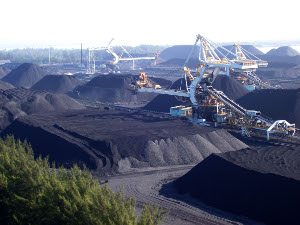
[miningmx.com] – GRINDROD may be frustrated in its attempts to combine its coal terminal expansion plans with those of the state-owned transport utility, Transnet.
According to Tau Morwe, CEO of Transnet’s National Ports Authority (TPA), the company is considering a third “independent’ operator to manage its plans for a 12 million tonne/year (mtpa) coal terminal in Richards Bay despite the fact Grindrod is planning cheaper brownfields expansion at its Navitrade terminal, also in Richards Bay.
Richards Bay Coal Terminal (RBCT), the largest of South Africa’s coal terminal operators and which has SA’s major coal export companies such as GlencoreXstrata and BHP Billiton Energy SA as its shareholders, also wants to dovetail with the TPA. “My dream is to sit around a table with Transnet and to collaborate,’ says Mike Teke, chairperson of RBCT, and deputy president of the Chamber of Mines.
That looks unlikely. Says Morwe: “When we appoint an operator we will make a decision on whether RBCT or Navitrade should expand, or if it should be handed to another operator,’ he said.
What Morwe wants to avoid is extending the dominance of RBCT, which has capacity to handle 91mtpa of export coal, or Grindrod which wants to build out its Navitrade terminal to 20mpta over time from the current 4mpta. Morwe also wants to know who will benefit for these expansions.
Transnet has for several years been in negotiations with RBCT over providing more export entitlement to black-owned companies. This is roughly in line with the policy of Government’s public enterprises department (DPE) which said in December 2012 that it wanted more black empowered coal companies providing coal to Eskom.
Since, from a geological perspective, energy coal to Eskom frequently occurs with export coal, it’s logical that the DPE also envisages more export coal capacity in the hands of start-up, empowerment companies.
Nosipho Damansane, CEO of RBCT, argues that’s already the case, at least from an export coal point of view. About 4mtpa of coal export capacity is available through RBCT’s Quattro system, while a further 15mpta was made available to empowerment companies when RBCT expanded to 91mtpa. “You can’t say it’s a closed system,’ says Damasane.
She says RBCT intends to kick on with its proposal to expand to 110mtpa regardless, although that would require approval from the TPA, meaning Transnet has a say in the events. Morwe comments, somewhat dryly, that the authority would have to see whether RBCT’s expansion to 91mtpa allowed for a further increase in capacity.
Dave Rennie, CEO of Grindrod’s terminals and ports division, says commercially, it makes sense for the TPA to be looking at brownfields developments. “Bulk terminals without connectivity and access to warfage is no benefit to anyone,’ he said.
“We need to make sure that Transnet Freight Rail (TFR) and the TPA are aligned with Navitrade, and that the capital we spend is aligned, and aligned with the capital Transnet spend,’ he said.
“We also need a supply chain from pit to port that is cost effective against alternative ports in South Africa and with competing exporters whether they be in Australia or Colombia,’ Rennie said. “Right through the whole service offering, the project funding is critical and we need to be on the same page.’
Over and above these comments, there’s also the somewhat large assumption that South Africa will have the additional coal to support these terminal expansions. All in, some 47mtpa of new terminal capacity is being planned by Transnet, RBCT and Grindrod. Bear in mind that RBCT is hoping it can reach 85mpta in the next few years only if Transnet can increase train deliveries.
That’s a big if. Amendments to the centrepiece mining legislation, the Mineral & Petroleum Resources Development Act (MPRDA) wants to hand discretion to the minister on things such as setting export prices for designated minerals such as coal and manganese and iron ore.
The amendment bill spells trouble, says BHP Billiton and Anglo American. If passed, the amendments will disincentivise new capital developments in South Africa’s coal industry and without the big capital, where will the coal expansions come from?











